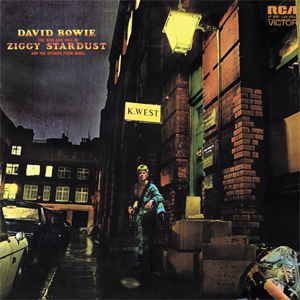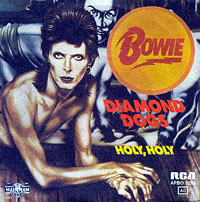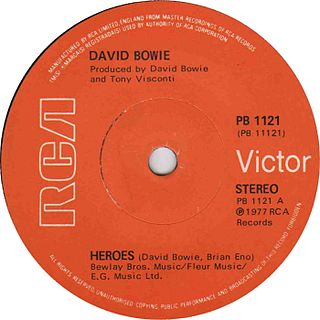See also
- "Holy, Holy, Holy! Lord God Almighty", an 1861 Christian hymn written by Reginald Heber
Holy Holy may refer to:

The Rise and Fall of Ziggy Stardust and the Spiders from Mars is the fifth studio album by English musician David Bowie, released on 16 June 1972 in the United Kingdom by RCA Records. It was produced by Bowie and Ken Scott and features Bowie's backing band the Spiders from Mars — Mick Ronson, Trevor Bolder and Mick Woodmansey. Most of the songs were written around the same time as its predecessor Hunky Dory. After that album was completed, recording for Ziggy Stardust commenced in November 1971 at Trident Studios in London, with further sessions in early February 1972.

"Under Pressure" is a song by the British rock band Queen and singer David Bowie. Originally released as a single in October 1981, it was later included on Queen's 1982 album Hot Space. The song reached number one on the UK Singles Chart, becoming Queen's second number-one hit in their home country and Bowie's third, and also charted in the top 10 in more than ten countries.

The discography of English singer-songwriter David Bowie (1947–2016) consists of 27 studio albums, 21 live albums, 46 compilation albums, 10 extended plays (EPs), 128 singles, 4 soundtracks and 12 box sets. Bowie also released 28 video albums and 72 music videos.

Hunky Dory is the fourth studio album by the English musician David Bowie, released on 17 December 1971 by RCA Records. Following the release of his 1970 album, The Man Who Sold the World, Bowie took time off from recording and touring. He settled down to write new songs, composing on piano rather than guitar as on earlier tracks. Following a tour of the United States, Bowie assembled a new backing band consisting of guitarist Mick Ronson, bassist Trevor Bolder and drummer Mick Woodmansey, and began to record a new album in mid-1971 at Trident Studios in London. Future Yes member Rick Wakeman contributed on piano. Bowie co-produced the album with Ken Scott, who had engineered Bowie's previous two records.

David Bowie is the self-titled debut studio album by English musician David Bowie. It was released in the UK on 1 June 1967 with Deram Records. Its style and content is often said to bear little overt resemblance to the type of music that he was later known for, such as the folk rock influenced "Space Oddity" or the glam rock of The Rise and Fall of Ziggy Stardust and the Spiders from Mars. NME critics Roy Carr and Charles Shaar Murray have said, "a listener strictly accustomed to David Bowie in his assorted '70s guises would probably find this debut album either shocking or else simply quaint", while biographer David Buckley describes its status in the Bowie discography as "the vinyl equivalent of the madwoman in the attic". Nicholas Pegg contends that "it seems a pity that David Bowie is only ever considered in terms of what we can extrapolate from it [...] Thankfully, it does seem that pop musicologists are at last beginning to regard David Bowie not just as a quirky set of embryonic twitterings, but as an album that's actually worth considering in its own right".

Anthony Edward Visconti is an American record producer, musician and singer. Since the late 1960s, he has worked with an array of performers. His first hit single was T. Rex's "Ride a White Swan" in 1970, the first of many hits in collaboration with Marc Bolan. Visconti's lengthiest involvement was with David Bowie: intermittently from the production and arrangement of Bowie's 1968 single "In the Heat of the Morning" / "London Bye Ta-Ta" to the 2016 release Blackstar, Visconti produced and occasionally performed on many of Bowie's albums. Visconti's work on Blackstar was cited in its Grammy Award for Best Engineered Album, Non-Classical and his production of Angelique Kidjo's Djin Djin was cited in its Grammy Award for Best Contemporary World Music Album.

Let's Dance is the 15th studio album by English singer-songwriter David Bowie, released on 14 April 1983 by EMI America Records. After the release of Scary Monsters (1980), Bowie began a period of numerous musical collaborations and film appearances. During this time, he also left RCA Records due to dissatisfaction. After signing with EMI America in late 1982, Bowie decided he wanted a fresh start, and chose Nile Rodgers of the rock/disco band Chic to co-produce his next record.

The Man Who Sold the World is the third studio album by English musician David Bowie. It was originally released by Mercury Records in the United States on 4 November 1970 and in the United Kingdom on 10 April 1971. The album was produced by Tony Visconti and recorded at Trident and Advision Studios in London during April and May 1970. It features the first appearances of guitarist Mick Ronson and drummer Mick Woodmansey on a Bowie record, who would later become famous as members of the Spiders from Mars.

"Diamond Dogs" is a 1974 single by English singer-songwriter David Bowie, the title track of the album of the same name.

Tin Machine were a British-American hard rock supergroup formed in 1988, notable for being fronted by English singer-songwriter David Bowie. The band consisted of Bowie on lead vocals, sax, and guitar; Reeves Gabrels on guitar and vocals; Tony Fox Sales on bass and vocals; and Hunt Sales on drums and vocals. Tony and Hunt are the sons of American comedian Soupy Sales. Additional musicians who performed with the band on tour or in the studio, but were not members of the band itself included English guitarist Kevin Armstrong, who played on the band's first studio album and first tour, and American guitarist Eric Schermerhorn who played on the second tour and live album Tin Machine Live: Oy Vey, Baby (1992).

"'Heroes'" is a song by English singer-songwriter David Bowie. It was co-written by Bowie and Brian Eno, produced by Bowie and Tony Visconti, and recorded in July and August 1977 at Hansa Studio by the Wall. It was released on 23 September 1977 as the lead single from his 12th studio album of the same name, backed with the song "V-2 Schneider". A product of Bowie's "Berlin" period, the track was not a huge hit in the United Kingdom or the United States after its release, but it has since become one of his signature songs. In January 2016, following Bowie's death, the song reached a new peak of number 12 in the UK Singles Chart. "'Heroes'" has been cited as Bowie's second-most covered song after "Rebel Rebel".

"Boys Keep Swinging" is a song by English singer-songwriter David Bowie. It was released as a single from the album Lodger on 27 April 1979.

"This Is Not America" is a song by English singer David Bowie and American jazz fusion band Pat Metheny Group, taken from the soundtrack to the 1985 film The Falcon and the Snowman. It was released as a single in February 1985, reaching number 14 in the United Kingdom and number 32 in the United States. The instrumental song that "This Is Not America" is based on was written by Pat Metheny and Lyle Mays and is itself a song called "Chris", which was also included on the soundtrack for the film.
Michael "Woody" Woodmansey is an English rock drummer best known for his work in the early 1970s as a member of David Bowie's core backing ensemble that became known as the Spiders from Mars in conjunction with the release of Bowie's 1972 LP The Rise and Fall of Ziggy Stardust and the Spiders from Mars. With the death of Bowie in January 2016, Woodmansey became the last surviving member of the Ziggy Stardust studio band.

"Oh! You Pretty Things" is a song written by David Bowie, which appears on his 1971 album Hunky Dory. It opens with only piano and Bowie's vocal, before entering the refrain. The simple piano style has been compared with the Beatles' "Martha My Dear". Thematically, the song has been seen as reflecting the influence of occultist Aleister Crowley, philosopher Friedrich Nietzsche, and Edward Bulwer-Lytton's 1871 novel Vril, the Power of the Coming Race, and heralding "the impending obsolescence of the human race in favour of an alliance between arriving aliens and the youth of the present society".

James Stevenson is an English punk/alternative rock guitarist, at one time a member of the Alarm, Gene Loves Jezebel, Gen X, the Cult, Holy Holy, The International Swingers and Chelsea.
"Without You I'm Nothing" is a 1999 single by British alternative rock band Placebo. The title track of their second album, the single version featured additional vocals by David Bowie. The single reached number 79 on the French Singles Chart, and number 52 on the Australian ARIA singles chart.
Heroes or Héroes may refer to:

The Isolar II – The 1978 World Tour, more commonly known as The Low / Heroes World Tour or The Stage Tour, was a worldwide concert tour by David Bowie. The tour opened on 29 March 1978 at the San Diego Sports Arena continuing through North America, Europe and Australia before reaching a conclusion at the Nippon Budokan in Japan on 12 December 1978.